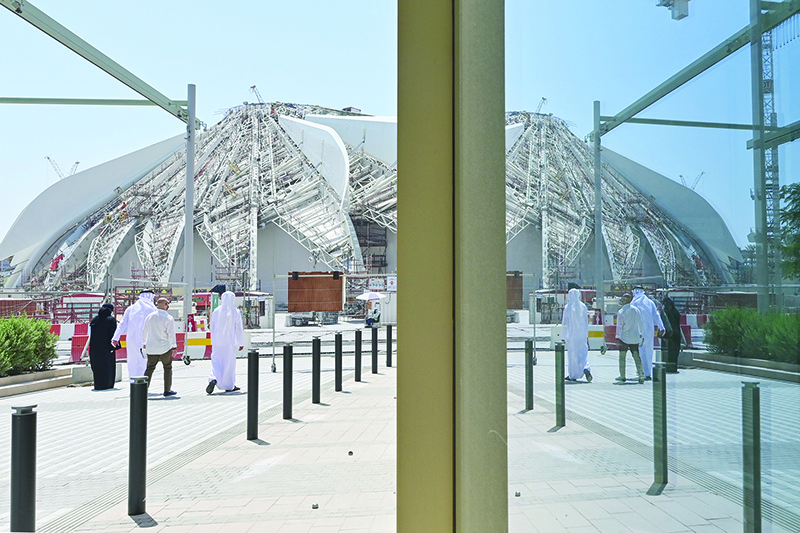

DUBAI: Armies of workers in protective masks are racing to complete the mammoth Dubai Expo 2020 site despite the coronavirus that has sickened some employees, forced a one-year postponement, and created a logistical headache.
The six-month world fair, a milestone for the emirate which has splashed out $8.2 billion on the eye-popping venue in the hope of boosting its soft power and resetting the economy, will now open its doors in October 2021. But organizers grappling with the complexities of rescheduling the event are intent on delivering the main buildings of the Expo by the original start date. They are keeping the Expo 2020 name and logo, which is emblazed on everything from billboards to aircraft.
As well as the onset of the scorching Gulf summer, organizers have had to contend with coronavirus infections and layoffs among a large workforce recruited from across the world. "Of course, the impact of COVID-19 has affected the logistics and the processes of delivering some of the remaining works,” said Ahmed Al-Khatib, chief development and delivery officer.
But "work continues and some of the pavilions have actually reached a very final stage. 2020 is the year of delivery,” he told AFP during a rare visit to the site, which will be mothballed once the major work is done.
Difficult decisions
Once a tangle of concrete and dust, the 4.5 square kilometre venue has now risen from the deserts of Dubai. Many of the buildings’ main structures have been completed. The United Arab Emirates pavilion, built in the shape of a falcon in flight, is only a few feathers away from completion, while the adjacent Saudi Arabian pavilion is now a huge window opening up into the sky.
Tunnels are open and streets have been paved. The sound system and 5G towers have been installed, and transplanted mango and olive trees are flourishing. Before the coronavirus pandemic, Dubai hoped the largest event ever staged in the Arab world—billed as the "World’s Greatest Show”—would attract some 25 million visitors.
It will showcase dozens of pavilions among the 192 participating countries including Israel, despite the Jewish state having no diplomatic ties with the UAE.
Since the first "World Expo” was held at London’s Crystal Palace in 1851, global fairs have been used to showcase new ideas and technology as well as serving as nation-branding exercises. With a lavish promotional campaign featuring superstars such as Lionel Messi, Dubai hopes the Expo will be a lifeline for the property, tourism and trade sectors, after years of malaise in the region which has now been aggravated by the global coronavirus-induced slowdown.
Chief Engagement Officer Manal Al-Bayat said the postponement approved in May by the governing Bureau International des Expositions (BIE) had no impact on the "commitment to deliver an Expo that inspires the world”.
But as the timeline stretches out, putting pressure on budgets, it has led to layoffs among staff that once thronged the air-conditioned temporary buildings on site. "Very sadly, a number of Expo employees will be leaving us. Of course, the decision was very difficult taken in (the) context of the postponement and it’s difficult because they’re members of the tribe,” said AlBayat, without specifying how many jobs were lost.
Daily challenges
On the vast Expo site south of the city, the pandemic creates daily challenges, as workers converse and share crane boxes, at a time when the UAE is still registering hundreds of new infections every day.
Al-Bayat said that among the many precautionary measures are a testing facility built on site and awareness sessions held for workers. But like many workplaces in the region, infections have emerged. "We have had some positive cases with our workers as well as with our Expo staff,” she said, declining to say how many. "We ensure that if anyone has tested positive they do not come back until they have tested negative and have been approved by the health authorities to come back to work regardless of whether they are workers or Expo employees”. — AFP
More than half of the coronavirus cases registered in the six Gulf countries—which now exceed 355,000 and rising—are among foreign workers, who often live in cramped conditions that do not allow for social distancing.
Measures to contain the coronavirus pandemic forced Dubai—which attracted 16.7 million visitors last year—to close its doors in March. It is aiming to reopen ahead of the start of the tourist season in September, when the summer heat dissipates. "We believe that Dubai will come back to its number of visitors and we will work closely to achieve the best number of visitors for our Expo,” said Al-Khatib when asked whether original goals would need to be revised.
"One year of postponement means more... room for improvement,” he added optimistically. — AFP

